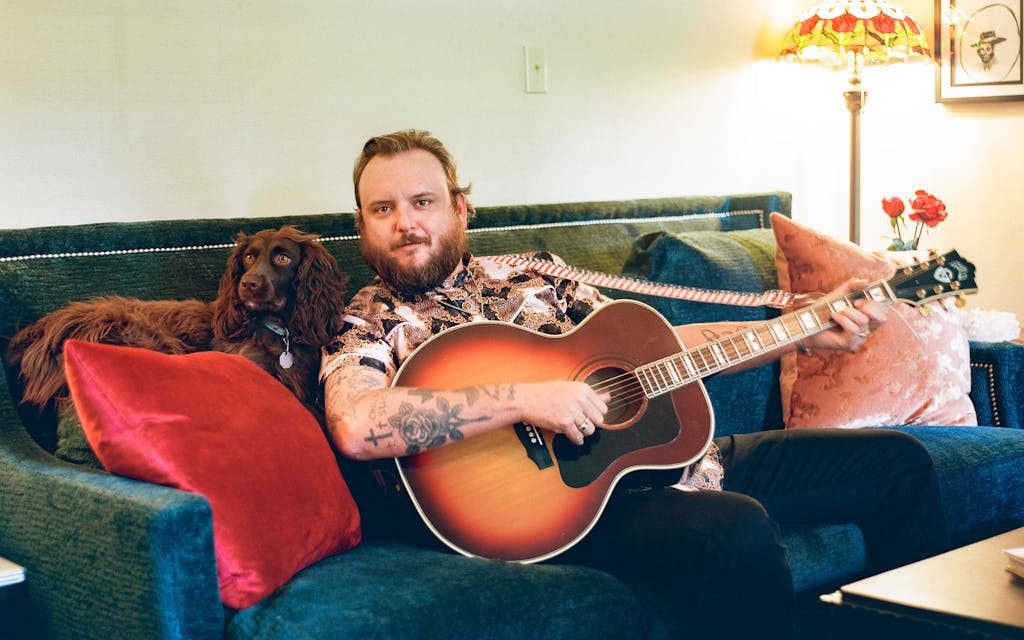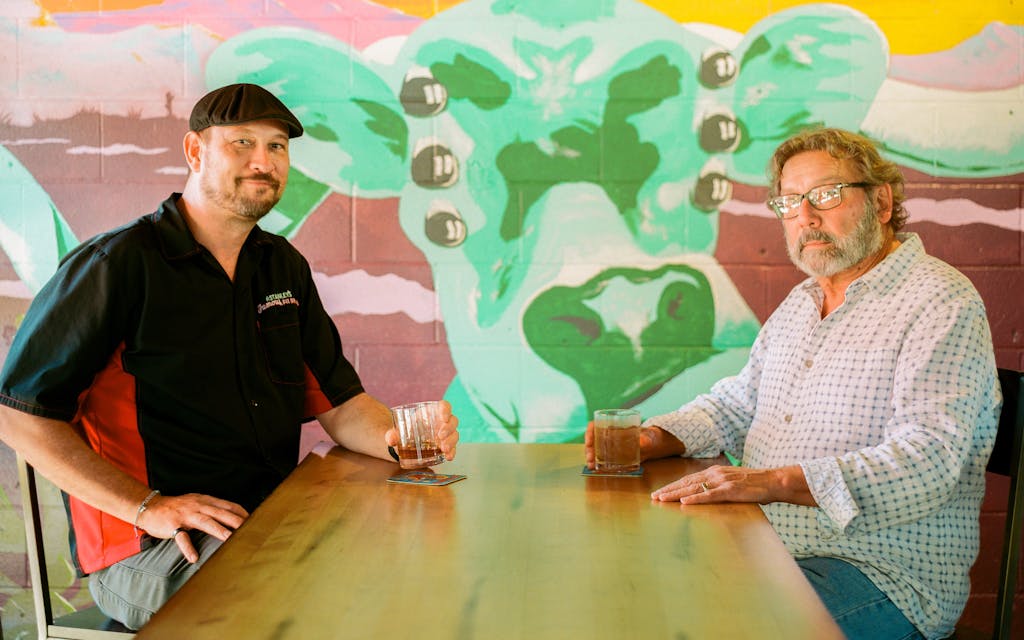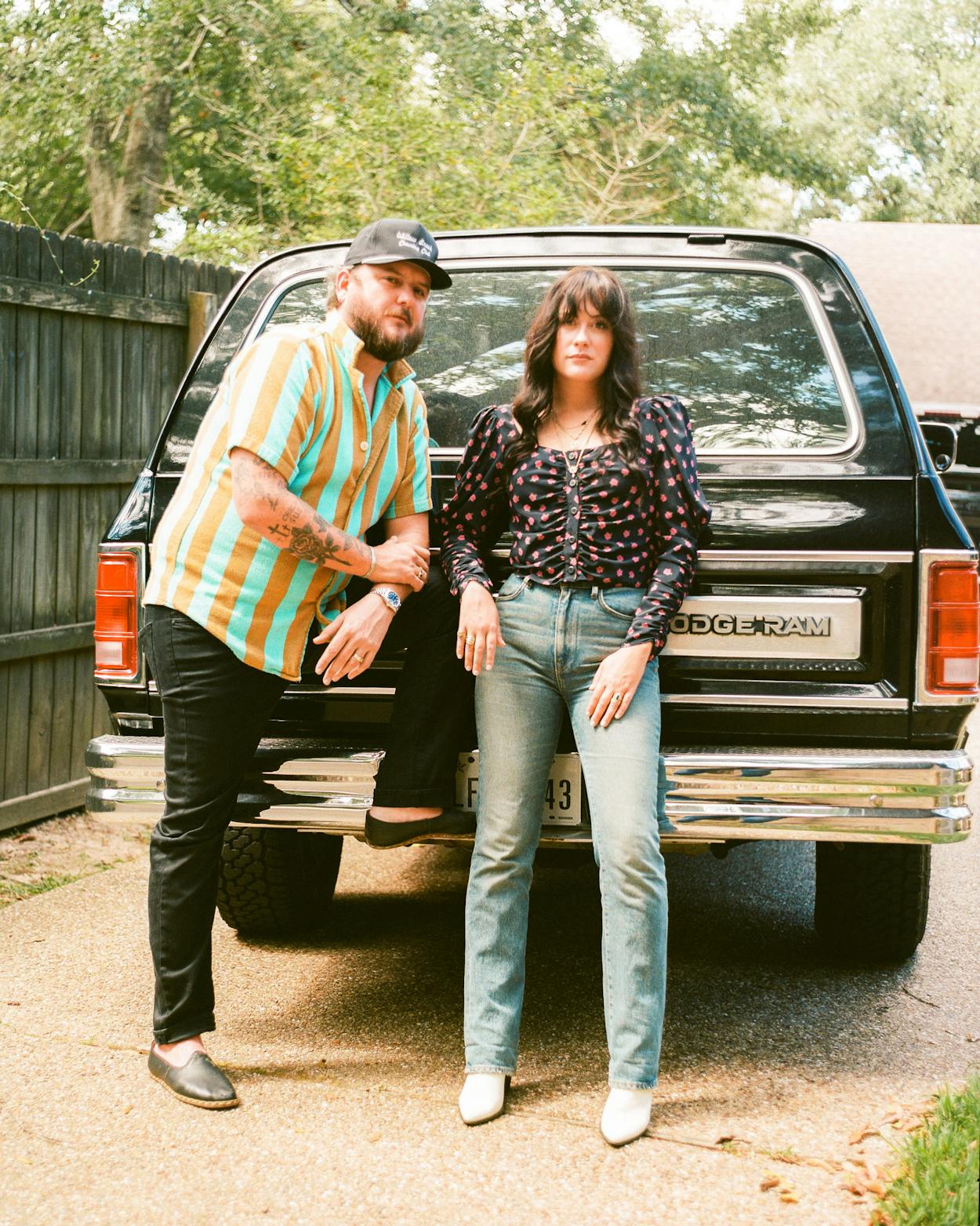Paul Cauthen wrote his first song when he was ten years old and heartbroken. His grandfather, Jim, had just passed away and the young Cauthen sat on the ledge of the covered patio behind his childhood home in Tyler and cried while trying to work out the words. Twenty-five years later, Cauthen is sitting on the same patio, and between puffs of weed and sips of black coffee, he recites some of those early lyrics: “Sweet spirit, iron heart, I can hear it, whether we were together or apart, I always knew Jim would be there.”
That sort of emotional vulnerability combined with the brash outlaw-country persona that commands stages across the country is a major part of Cauthen’s artistic power. But Cauthen isn’t putting on a show right now. He is remembering his grandparents, to whom he owes much of his early musical education. He learned to sing by following the bass lines of hymnals while attending church with them, and Jim taught him guitar. And we’re sitting at his childhood home, a place he left not too long ago intending never to return, which he now owns and shares with his wife Elizabeth and a revolving cast of musicians, tour managers, friends, and family.

A red wasp had been buzzing around our heads as we talked, and Cauthen eventually decided to take the matter in hand. Suddenly, out came a playful, goofy side of Cauthen. Trust me: you haven’t lived until you’ve seen a husky, six-foot-four country singer clad in a teal-and-gold-striped terry-cloth shirt leaping around, cussing and laughing while trying—and failing—to kill a flying insect with his bare hands. “I think he’s gone. He knows we’re not f—ing around,” Cauthen declared after scaring it off. I’ve seen Cauthen perform live when his mix of bombastic, hip-shaking bravado and tender, introspective crooning makes for an unforgettable concert. But this wasn’t a performance. This was Cauthen, after years spent wandering the country in search of himself, finally feeling right at home.
He came frighteningly close to never finding his way back. From 2017 to 2019 Cauthen was living a rough-and-tumble life holed up in room 41 at Dallas’s Belmont Hotel. Cauthen says he almost died inside that room, inconsolable from a broken engagement and constantly in an alcohol-and-drug-induced stupor. He’d drive his Harley over 100 miles per hour over bridges at night, not worrying about living another day. Some mornings he’d wake up with no memory of the night before and find song ideas he’d left recorded in his phone’s voice memos, like messages from his own ghost.
He got a great album out of it, 2019’s searing Room 41, but Cauthen looks back on those days with regret. A friend recently asked him if, given the chance, he would do it all over again. “Hell no. I don’t know if I could make it. I think I’m very, very lucky.”


Cauthen didn’t leave Tyler the first time of his own volition. When he was an eighteen-year-old high school senior, he and three friends were arrested on drug and alcohol charges. His parents shipped him off to Abilene Christian University, hoping it would clean him up. Instead, a parole violation landed him in prison for a short stint, after which he moved to Colorado in 2007 and started dealing drugs while working on his music. After learning the trade he made his way down to San Marcos in 2010, where he acted as a broker between his connections in Colorado and Texas. Cauthen says he financed much of his early music career by making drug deals while on the road playing shows. He was never arrested (although some of his friends weren’t so lucky). While in San Marcos he teamed up with fellow musician David Beck to form the Americana duo Sons of Fathers, touring the country and releasing two albums, 2011’s Sons of Fathers and 2013’s Burning Days. He and Beck split in 2014, and Cauthen moved to Dallas the next year. His solo career took off with his debut album My Gospel in 2016, and three years later, Room 41 reached number two on Billboard’s Heatseekers chart.
By 2019, he was, relatively speaking, clean, and happily engaged to Elizabeth NeSmith, a fashion designer he’d met a year earlier. Last year the couple were visiting Cauthen’s family in Sulphur Springs, and decided to drive to Tyler to say goodbye to Cauthen’s childhood home, which his mother was planning to sell. On the drive over, Cauthen’s sentimental side came out and he teared up telling Elizabeth what the house meant to him. He moved there when he was seven years old with his two sisters and his mother after his parents divorced. Memories of the comfort the home brought him during that difficult time, and especially of watching his grandfather remodel it the summer before his health started failing, made Cauthen heartbroken to think about losing it. “I said, ‘We’re just going to move there; I don’t even need to see it,’ ” Elizabeth recalls. When they got to the house they FaceTimed Cauthen’s sisters to tell them they were buying a house, then panned the camera out to show them they were actually buying the house the siblings had grown up in. “My sisters started crying because everybody was emotional about getting rid of this home,” Cauthen says.
Moving to Tyler made financial sense—it’s a lot more affordable than Dallas—but it also offered Cauthen a fresh start. In the same way leaving Tyler to dive headlong into drugs and music appealed to the younger Cauthen, coming back home to the welcoming pines of East Texas to start a family appealed to his older self. Here he doesn’t have to always be “Big Velvet,” the nickname he got for his smooth baritone voice. He can just be Paul, the onetime class clown who can relax with many of his childhood friends, who work normal jobs. And it doesn’t hurt that Tyler has easy access to his favorite things. “I like to be on the lake drinking cold beer, listening to a lot of Alan Jackson, and playing golf,” he says.
But Cauthen didn’t move to Tyler to live the life of a retiree or a local celebrity, nor to get away from his life as a country star. He moved here to help make Tyler something it has never been: cool. “I feel like I’m called to bring in things that kids and people aren’t exposed to naturally in this habitat,” he says. “Usually you have to go into big cities and dive bars and different spaces that are out of your comfort zone to see [art, music, food, and fashion] that will blow your mind.”

He’s not the only one working to transform the town. As a teenager in Tyler in the nineties, Nick Pencis was so starved for live music that he and his buddies would climb the rickety fire escape of a building downtown to peer at the local bands performing on the patio of Rick’s on the Square, one of the town’s few live-music venues at the time. The place’s namesake owner, Rick Eltife, would spot them, climb up the fire escape, smoke a cigarette with them, and then tell them to skedaddle.
Eltife hated to send them running, but he knew the fire escape wasn’t safe. He sympathized with their desire to see live music; after all, that was the exact reason he opened Rick’s in 1992. And he chose to put the venue downtown because the area was almost completely empty when he purchased the building in 1990. “Downtown Tyler had been dead for fifteen years by the time I bought that building,” the seventy-year-old recalls. “There was nothing going on. It was like a ghost town down there after about five or six o’clock. I figured I’d be able to do live music outside and it wouldn’t bother anybody.”
These days, 44-year-old Pencis and his wife, Jen, own Stanley’s Famous Pit BBQ, which over the last few years has become Tyler’s premier live-music venue (and premier barbecue joint; it made Texas Monthly’s 50 Best BBQ Joints list this year). A former drummer with the band Greyhounds, Pencis has used his connections in the music world to bring in increasingly well-known names to grace the renovated and expanded stage and bar area at Stanley’s. Charley Crockett, Tab Benoit, and others have traveled to Tyler this year for shows at Stanley’s, while weekends without outside talent are filled with local musicians or tribute acts.


Pencis and Cauthen go way back—Cauthen worked as a sandwich maker at Stanley’s back in 2009 when he briefly came back to town to make some money before going back to his music career. When Pencis discovered Cauthen was a musician, he told him to put aside his apron and play guitar outside for the people waiting in line. Sometimes Pencis would join him by slapping the front door as if it were a cajón. So it’s no surprise that when Cauthen moved back to town, the two would become allies in working to improve Tyler’s live-music scene. Cauthen performed two sold-out shows at Stanley’s in July. He spoke from stage about shows they are planning for other artists at venues all over Tyler, such as the recently renovated Bergfeld Park Amphitheater.
Stanley’s is hardly the only sign of life in town. Don Warren, Tyler’s mayor, says that when his daughter and her husband moved to Tyler from Atlanta in 2008, Warren’s son-in-law described the city as “gray.” It doesn’t look gray anymore. In the downtown area, one can find an oyster bar, a fine-dining steak house, a brewpub, coffee shops, a skin-care and aromatherapy shop, a vintage clothing and furniture store, and Elizabeth Cauthen’s new boutique, House of Velvet Rose. And Rick’s on the Square is still going strong.
Cauthen has fond memories of leaving Tyler to see mind-blowing performances from artists like ZZ Top and Don Henley. Today, he hopes that aspiring musicians in Tyler won’t have to drive to Dallas or Houston to see something transformative. “This place is home and it’s becoming cooler and more laid-back,” Cauthen says. “It’s a Bible Belt community, which is great. But at the same time you can’t be afraid to cut a rug and let loose.”
- More About:
- Music
- Country Music
- Tyler






